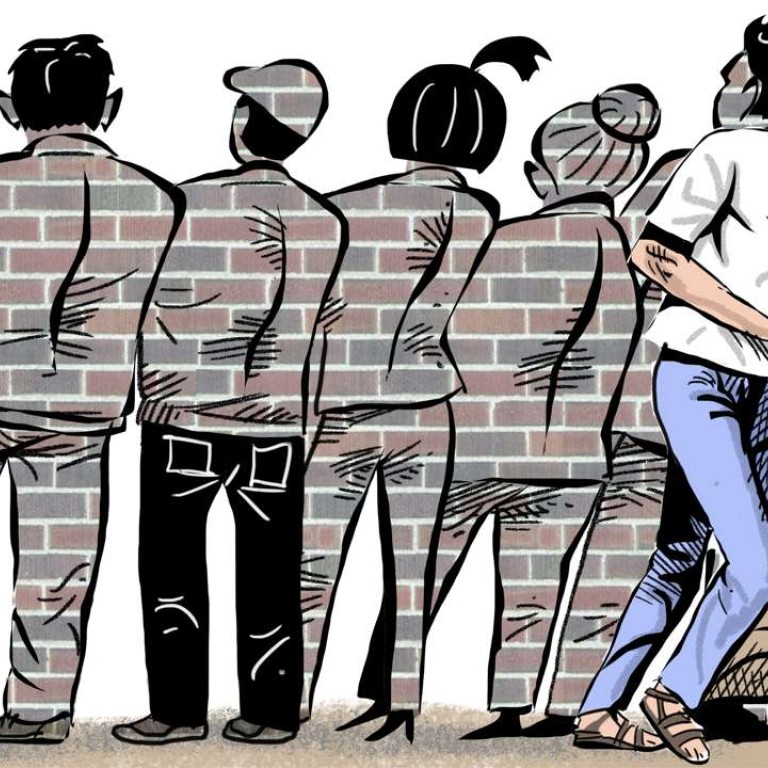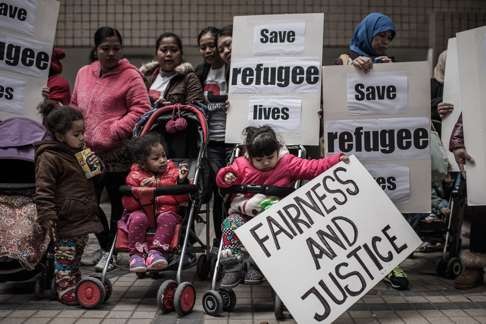
Hong Kong has no refugee crisis, only a crisis of response
Tony Read says the issue of asylum seekers invites knee-jerk reactions but we must look at the facts
In the last few weeks, there has been a steady trickle of voices advocating the use of closed camps and withdrawal from the UN Convention Against Torture as a response to the growing influx of migrants to Hong Kong. Once having made entry to the region legally or illegally, it is comparatively easy for immigrants to make an asylum claim, thus giving them access to Hong Kong’s welfare system for protection claimants and an opportunity to seek out illegal work if they are so minded.
Put asylum seekers in reception centres and pull out of UN torture convention, says Hong Kong lawmaker
Despite a distinct lack of enthusiasm for these radical solutions from the Beijing leadership, both these ideas seem to persist in the minds of many political commentators and opinion makers as some sort of magic silver bullet. It’s as if at a single stroke (or maybe two), we think the problem will be solved, so we can get on with our lives again.
Alarmists warn about the dangers of being swept into the harbour by a tsunami of immigrants
However, it is quite clear that this is a complex issue and to treat it as just a matter of picking the right deterrent is not going to provide a lasting solution. But even before trying to tackle the complexities, we need to ask the question: How serious is this threat?
Firstly, the numbers. The alarmists have warned about the dangers of being swept into the harbour by a tsunami of immigrants if we even suggest accepting as residents the just-less-than 1 per cent of claimants who are successful. The fact is that we have a total accumulated backlog of around 11,000 claims from the last three years of screening waiting to be assessed, yet we happily accommodate over 50,000 new entrants to Hong Kong each year from mainland China without even batting an eyelid. It is hardly credible to say that we have a population crisis, even in our admittedly crowded society.

Build a detention camp in Shenzhen for Hong Kong’s asylum seekers: former security chief Regina Ip
Secondly, the financial threat. It’s really not necessary to do the numbers on this to realise that the total costs of immigration manpower, increased border control, duty lawyer fees, social welfare and financial handouts, significant as they may be, are not going to put a dent in Hong Kong’s financial resources. It may seem to be money down the drain but it’s not going to sink the economy.
Thirdly, crime and social stability. The press and social media have reported widely on the involvement of asylum seekers in crime, drug trafficking, prostitution and illegal working. Again, this is certainly not to be condoned or passed over lightly but, in real terms, the amount of criminal activity and socially unacceptable behaviour by asylum seekers is low compared to the overall crime rate and is certainly not fuelling any upsurge of criminal activity in the city.
So what crisis are we facing if it’s not that critical? Well, it would certainly not seem to justify a knee-jerk reaction like setting up closed camps or withdrawing from the UN torture convention, but it is certainly serious enough to warrant careful attention. What we are experiencing is actually a crisis of response. How do we respond well?
Hong Kong people smuggling syndicates smashed: nearly 3,000 illegal immigrants arrested in joint operation with mainland police
The recent cross-border police operations to smash people smuggling syndicates and arrest immigrants arriving illegally by boat is a good response to cut off the flow of illegal immigrants making bogus asylum claims. However, it must also be appreciated that these same routes and methods may be used as an escape route to asylum by those who have genuinely suffered persecution and whose lives may be in danger.
This illustrates just how difficult it is to make an accurate differentiation between “fake” and “genuine” claims without going through the screening process, and also how dangerous it is to apply the label “bogus” indiscriminately to all those landing illegally.

Hong Kong’s asylum system is in urgent need of repair
The recent influx of so-called “fake refugees” has opened up deeper issues which remain well buried in our society. These are now coming to the fore and subconsciously influencing society’s reaction and the responses that we are hearing. These need to be examined and dealt with appropriately if we are to see a good overall resolution to this issue.
Now is the time for the government to review its refugee policies
At the heart of the matter, there are probably issues of racial prejudice, ethnic assimilation and even “localism”. Professor Matthew Gibney of Oxford University’s Refugee Studies Centre has identified a number of factors which influence cultural responses to the threat of a refugee influx, such as regional relationships, past history and ethnic relatedness. These are some of the complexities that need to be examined, along with the practical issues of border control, screening processes, media mobilisation, human rights and security.
Hong Kong has many learned experts and academics on refugees and migration in its own universities; passionate lawyers and human rights advocates dealing with immigration law; and dedicated NGO practitioners working with asylum seekers on a day-to-day basis. These together form a valuable resource base which can bring insight and understanding on how to best deal with this issue. Now is the time for the government to review its refugee policies in the context of this wider perspective and draw upon this collected experience.
In a globalised world, we must begin to accept that no country or region can consider itself to be immune from the effects of global migration. In developed economies, we have to wrestle with these problems, as Europe is now doing, and learn how to develop sustainable multicultural societies. Building walls and devising deterrents only work in the short term before they become seen by society as repressive symbols of authoritarianism.
Tony Read is a justice advocate working with refugee and asylum seekers in Hong Kong
